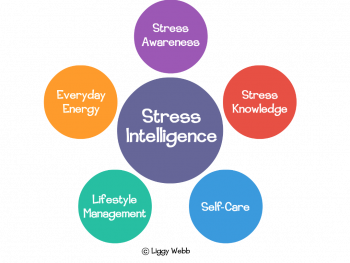Resilience – How to build your inner strength
Resilience is a truly rich and multi-faceted life skill and is about embracing our “humanness” and understanding and accepting that we will inevitably experience setbacks and disappointments. We will make mistakes and get things wrong because we were not born to be perfect; we were born to be real.
Whilst I was researching my first book “Resilience – How to cope when everything around you keeps changing”, I had the privilege of interviewing people from all over the world, from lots of different backgrounds, who were generous enough to share their personal stories with me. This taught me a great deal about resilience, in addition to the wealth of scientific research around this fascinating subject.

So, before we even begin to explore resilience, I would like to emphasise first and foremost that being resilient is not about ‘toughing it out’, at any cost. Too often, especially in the work environment, I observe people doing this and sometimes to the detriment of their own physical and mental health.
What is resilience?
Resilience essentially is the process of adapting and recovering well from adversity, trauma, tragedy or threats. Some people describe resilience as: “the ability to bend, instead of breaking, when experiencing pressure” or “the ability to persevere and adapt, when faced with challenges”. The same abilities also help us to be more open and willing to take on new opportunities.
Something I have certainly learnt about resilience is that the curve balls and challenges that life inevitably throws at us, are often the most valuable lessons for building our resilience.

Take a journey of self-discovery
Self-awareness, self-confidence, and self-efficacy all play an essential role in helping us to cope better with stress and recover from difficult experiences. Knowing and understanding ourselves is the first port of call and being aware of our limitations and strengths is key.
Becoming more confident about our own ability to respond and deal with a crisis is a great way to build resilience for the future. Challenges can be steppingstones or stumbling block and it is very much a matter of how we view them and how much faith we have in our ability to embrace and navigate those challenges.
Be optimistic
Staying optimistic during dark periods can be difficult and it is important to maintain a hopeful outlook. Being an optimist does not mean being naive and ignoring the problem. It means understanding that setbacks are transient and that we have the skills and abilities to combat the challenges we face.
There is a risk when something difficult arises that we fall into the pessimistic trap of believing that everything is doom and gloom. So much of resilience is about how we choose to respond to each situation and an optimistic perspective will most certainly lead us in a more positive direction.
Take emotional control
Being emotionally aware and recognising how we can potentially react in certain situations will help us to exercise more self-control. It will also help us to be more considerate with regards to how our response can affect other people. Keeping calm will allow us to manage our stress levels and gain a more balanced perspective.
Hot and high emotion can be exhausting so managing emotions during any ordeal will help us to focus our energy where it is best placed. People who are emotionally intelligent and understand their emotions are generally far more resilient.
Change for the better
We may not be able to control or change circumstances; however, we can absolutely choose and change our attitude towards them, so we are far more in control than you think. Flexibility is an essential part of being able to manage change and, by learning how to be more adaptable, we will be much better equipped to respond to any life crisis we may experience.
Resilient people often utilise these events as an opportunity to branch out in new directions. While some people may be crushed by abrupt changes, highly resilient people are able to embrace change and seek to use their energy to influence it.

Cope well with conflict
Conflict is an inevitable part of life and there is nothing wrong with it and is only when it becomes combat that it becomes problematic. We all have different personalities and along with those go we have our belief systems, values, perspectives, likes and dislikes.
Yes of course some conflict can be difficult and, at times, unsettling – especially if we take it personally and are highly sensitive about it. The outcome of conflict, however, can be very positive and it can help us to create new ideas, learn from others, understand ourselves better and improve our own communication.
Embrace probortunities
The word probortunity is a hybrid between the words “problem” and “opportunity” and looks at the concept of taking every problematic situation and seeking out the opportunity. It works on the premise that in every crisis an opportunity will arise and there will be some benefit. Personally, I have found it a very useful approach to dealing with problems and it has helped me to tackle them from a different angle and see them as challenges rather than barriers.
Developing a good set of problem-solving skills is a valuable toolkit to equip ourselves with too and knowing what practical steps to take can provide us with some extra confidence and ability.

Look after yourself
When we are feeling traumatised, stressed and upset, it can be all too easy to neglect our own well-being. Losing our appetite, overeating, not exercising, not getting enough sleep, drinking too much alcohol, not drinking enough water, driving ourselves too hard, are all common reactions to a crisis.
This is the time when we need to work on building our self-nurturance skills, especially when we are troubled. Making time to invest into our wellbeing will boost our overall health and resilience and we will be better equipped and energised to deal with life’s inevitable challenges.

Make great connections
Building and sustaining a strong network of supportive friends, family and work colleagues will act as a protective factor during times of difficulty. It is important to have people we trust and can confide in.
Whilst simply talking about a situation with a friend or loved one will not necessarily make troubles go away, it will allow us to share our feelings, gain support, receive feedback and come up with possible solutions to our problems. Listening to other people’s experiences can be useful too and, although we can’t always learn from others’ mistakes, there will certainly be some good advice out there.
Keep going
“If you are going through hell, keep going.”
This is a quote that is attributed to Winston Churchill and sometimes we simply need to keep calm and keep going. In doing this however, it is not about toughing it out at any cost as I mentioned before. A string focus on self-care and being mindful of tapping into our healthy coping mechanisms are essential.
As we journey through life’s challenges it is also important to let go of any of the angst that we experience rather than carrying lots of negative baggage with us. Being able to able to draw a line, take the constructive learning and focus on the positives of the future is about healthy recovery from any negative setback.
Looking to the future and creating a positive vision of where we would like to be and what we would like to attract into to our lives can help us to bounce forward and positive embrace the next chapter.

Special offer – 25% off
Save 25% on your copy of Liggy’s BiteSized book on Resilience by using coupon code SAVE25 at the checkout
For updates for future blogs, free webinars and various other useful resources please do join my newsletter.













 5 ways to be a great collaborator
5 ways to be a great collaborator


